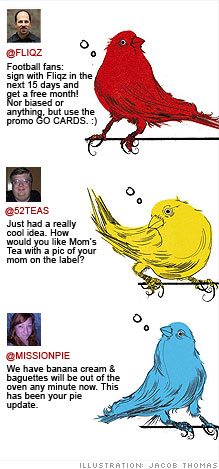Tweeting for profit
Smart entrepreneurs are now doing deals in 140 characters or less on Twitter.


(Fortune Small Business) -- A year ago Kris Drey couldn't care less about Twitter.
With 13 years of Web site experience, Drey is no technophobe. He serves as vice president of product marketing at Fliqz, an online video-hosting service with 20 employees in Emeryville, Calif. But when he first skimmed Twitter, the popular micromessaging service launched in 2007, Drey saw a lot of mindless chatter and very little that seemed useful to a video business.
Still, with the economy taking a dive, Drey persisted. He was looking for ways to spread the word about Fliqz without spending any more of his maxed-out $15,000 marketing budget. Not only was Twitter the fastest-growing social media service around -- its user base grew by a whopping 1,841% in 2008, to 14 million -- but it also wouldn't cost him a dime.
"The only overhead is your time," says Drey, 40. "You need to pay attention."
He did just that. Drey started posting three or four updates a day as @Fliqz (all Twitter IDs start with "@") and subscribed to (or "followed") the 140-character updates (or "tweets") of anyone he could find who seemed interested in the online video industry, even if the person was just posting links to stories on blogs. One Saturday afternoon Drey spotted a Twitter post from a Fliqz customer who was having trouble encoding video. After exchanging a couple of tweets with him, Drey called the customer on the phone, figured out that the guy had a corrupted file and fixed the problem. The customer posted a tweet of happy surprise.
Fast-forward a few months, and @Fliqz now boasts 1,358 followers. Thanks to Twitter, Drey snagged 21 new sales leads, and Twitter also helped him seal one $6,000-a-year contract. Fliqz signs or renews up to 30 deals a month, so the company is hardly tweeting its way to massive growth. But it's not too shabby a return for a free tool. Drey estimates that he spends eight hours a week on Twitter, or the equivalent of 2% of his marketing budget every year.
Call this the year business invaded Twitter. The service -- which can be used on any cell phone or computer -- has been a hit almost since its inception, with celebrities as diverse as Richard Branson and Britney Spears using it to tout their appearances and correspond with fans. But in the past year, @Comcast has set up what has effectively become a help desk on Twitter, while @JetBlue (JBLU), @Zappos, @WholeFoods (WFMI, Fortune 500) and @Starbucks (SBUX, Fortune 500) interact with hundreds of thousands of their followers.
"It's the most conversational medium in the world," says Jackie Huba, an online marketing consultant, blogger and co-author of the book Citizen Marketers. "It's immediate, public and searchable. It's never been easier to know what your customers and your prospects are saying about you."
A handful of small retail stores rave about their success on Twitter. In Wichita, tea company 52Teas (@52Teas) has more than doubled its sales of handcrafted teas of the week since it started tweeting. The company has 3,403 users following its weekly announcements of new blends.
"In 2007 we shipped one or two packages every two to three weeks," says Frank Horbelt, 38, founder of 52Teas. "Now we ship 52 packages a week."
In San Francisco, Mission Pie bakery (@missionpie) sends tempting tweets about its seasonal organic pies. "If there's a special and I tweet about it, it's pretty common that we sell out," says Ashleigh Cole, operations manager at the 14-employee bakery.
Of course, these are the outliers. Twitter has plenty of potential to be misused. For one thing, you get to sign up with any name you want that hasn't already been taken. This can lead to confusion: A search for "Starbucks" reveals 16 Twitter users with that word in their IDs, such as @starbucksgeek and @starbucksgal. The coffee giant owns only @Starbucks, but Twitter has no way of telling you that. In theory, a competitor could use your name and post harmful messages from that account. You could sue, of course, but Twitter is a legally untested arena.
Such business-name theft hasn't happened yet, and Twitter co-founder Biz Stone says one of his product managers is looking into setting up some kind of account-verification service.
"We're hearing stories about these businesses using Twitter that are so inspiring, and we want to figure out how we can help more," Stone says. One of his favorites concerns is Kogi Korean BBQ (@kogibbq) in Los Angeles, which sends updates to its 2,100 followers telling them where its taco truck will go next, prompting customers to line up before the van arrives.
Another problem: There aren't many sophisticated ways to filter the increasing Twitter chatter, and the service can become a major time-suck. When Drey did his searches for "online video," he had to spend hours crawling through tweets from teenagers about funny YouTube videos -- not exactly his client base.
"You will waste a lot of time if you go about it haphazardly," says Brent Arslaner, vice president of marketing at Unisfair, a virtual events company in Menlo Park, Calif. After hearing that friends and colleagues spent hours on the site, Arslaner limited his Twitter usage to a maximum of 30 minutes a day. He followed relevant industry peers and did searches for anyone mentioning Unisfair -- and for tweets that might lead to new business, such as "event canceled."
Even with that small an investment of time, Arslaner found 160 key analysts, partners, prospective clients, bloggers and other industry influencers. On Twitter he also came across a prospective customer who was asking the network for references on Unisfair. Arslaner responded immediately with a list of references, and his sales team closed the deal.
Tweeting too aggressively is a surefire way to become a Twitter reject. Use the service as an advertising channel or a newswire for press releases, says Huba, and you'll blow your chances with a lot of users -- who won't even tell you it's a problem. "There's not a huge revolt, but people will stop following you," she says. Your pitches may ultimately be heard by no one.
Other caveats from experts: Be responsive, especially to users who send you private "direct" messages. Be yourself, but as with any other business communication, be careful what you say. Some users have software such as Tweetdeck that download tweets, so there's a permanent record of your ill-advised joke even if you delete it. Be timely and relevant, and cyberspace will reward you.
"Always bring massive value to the conversation," says Joel Comm, author of Twitter Power: How to Dominate Your Market One Tweet at a Time. "Good things will come back at you."
Erik Oberholtzer, a co-owner of Tender Greens restaurant in Los Angeles, got his good karma in March when he tweeted about construction delays at his new West Hollywood location. The city would not sign off on the building because of technicalities involving flushless toilets. A few tweets later, one follower called his uncle, who works in the health department. The pressure worked, and Tender Greens opened the next month.
"Twitter creates this culture that can extend way beyond your store," says Oberholtzer, 40. "It's really powerful." ![]()
Track what your customers say about you
When bloggers attack
Google wants you
Should your business be on Facebook?
Oprah's Skypefest draws backlash
-
The Cheesecake Factory created smaller portions to survive the downturn. Play
-
A breeder of award-winning marijuana seeds is following the money and heading to the U.S. More
-
Most small businesses die within five years, but Amish businesses have a survival rate north of 90%. More
-
The 10 most popular franchise brands over the past decade -- and their failure rates. More
-
These firms are the last left in America making iconic products now in their twilight. More









